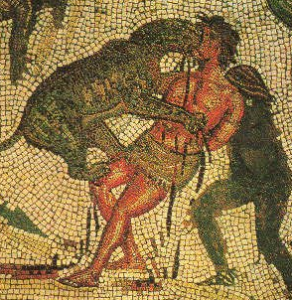by Fr. Patrick Henry Reardon
 There is wisdom and merit in the impulse to study the writings of Peter and Mark together; the First Epistle of Peter and the Gospel of Mark were both composed at Rome, in close sequence, and, as far as we can determine, in the context of the same crisis: the persecution of Christians in the aftermath of the fire that broke out in the capital on July 19 of the year 64 and destroyed much of the city.
There is wisdom and merit in the impulse to study the writings of Peter and Mark together; the First Epistle of Peter and the Gospel of Mark were both composed at Rome, in close sequence, and, as far as we can determine, in the context of the same crisis: the persecution of Christians in the aftermath of the fire that broke out in the capital on July 19 of the year 64 and destroyed much of the city.
We know of this fire and its aftermath from the writings of two pagan historians, Tacitus (Annals 15.38) and Suetonius (Lives of the Caesars 6.38), who also describe that persecution. The Emperor Nero, who was widely accused of starting the fire (for the purpose of urban renewal), sought to divert criticism from himself by blaming the local Christians for the arson.
This latter group was mainly composed of poorer folk, slaves and former slaves, day laborers, and so forth. There was no danger of implicating any of the more influential citizens who “counted” in Roman society. There ensued, consequently, an official and most brutal persecution of Christians, described in gripping detail by those same two pagan historians. During the course of the persecution, the Apostle Peter was crucified upside down on Vatican Hill, to the west of the city, across the Tiber.
Tacitus described the persecution:
“Nero created a diversion and subjected to the most extraordinary tortures those hated for their abominations by the common people called Christians. Mockery of every sort was added to their deaths. Covered with the skins of beasts, they were torn by dogs and perished, or were nailed to crosses, or were doomed to the flames. These served to illuminate the night when daylight failed. Nero had thrown open the gardens for the spectacle, and was exhibiting a show in the circus, while he mingled with the people in the dress of a charioteer or drove about in a chariot. Hence, even for criminals who deserved extreme and exemplary punishment there arose a feeling of compassion; for it was not, as it seemed, for the public good, but to glut one man’s cruelty, that they were being punished” (Annals 15.44).
It appears that the First Epistle of Peter was written shortly before the outbreak of that persecution. Peter refers to it as something imminent:
“Beloved, do not think it strange respecting the fiery trial which is to try you, as though some unusual thing were happening to you; but rejoice, inasmuch as you partake of Christ’s sufferings, that when his glory is made manifest, you may also be rejoice with exceeding gladness” (1 Peter 4:12-13).
When Peter wrote these words, we know, Mark was with him (5:13).
As for the Gospel of Mark, our earliest references to it indicate that it came into being in the aftermath of the Neronic persecution, during the course of which Peter himself perished. According to the consensus of the earliest witnesses, Mark wrote his gospel with a view to preserving and handing on Peter’s preaching about Jesus. These witnesses, speaking with one voice from around the Mediterranean Basin, include Papias of Hierapolis, the Anti-Marcionite Prologue, Irenaeus of Lyons, Tertullian, and Clement of Alexandria—all of them between A.D. 130 and 210.
Thus, the First Epistle of Peter and the Gospel of Mark belong to two stages in a crisis that followed the fire in Rome during the year 64:
- Peter wrote as the Neronic persecution was soon to begin, and
- Mark wrote in the ongoing context of it.
Both writers, that is to say—and Mark under the tutelage of Peter—appealed to the example of the persecuted Jesus to instruct and encourage his persecuted followers during that crisis.
Thus, Mark records-as Peter remembered-the words of Jesus:
“Whoever desires to come after me, let him deny himself, and take up his cross, and follow (akoloutheito) me. For whoever desires to save his life will lose it, but whoever loses his life for my sake and the Gospel’s will save it” (Mark 8:34-35).
Check the whole context, particularly Mark 8:31-33.
Peter is no less clear on the identical point:
“If, however, you endure it when you do good and still suffer, this is pleasing to God. For to this you have been called, because also Christ suffered for you, leaving you an example that you should follow (epakolouthesete) in his steps” (1 Peter 2:20-21).
